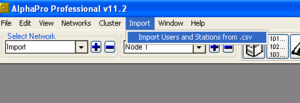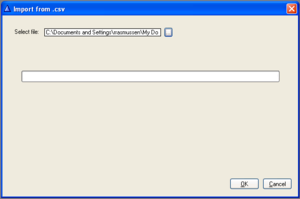Import Users and Stations from .csv file
From Zenitel Wiki
As from AlphaPro version 11.2.3.4 a feature for importing data from a .csv file was added. The function was extended with more fields in version 11.5.3.0 and in version 11.6.3.4.
The Import function is available from the Main Menu in AlphaPro.
File format from AlphaPro version 11.6.3.4
<directory number>;<id number>;<groups>;<group access level>;<cos>;<display text>;<udp groups>;<exp parameter>;<always private>;<mail in idle>;<global>;<ccoip>;<dak>;<station type>
Field description:
- <directory number>: The Directory Number of the user
- <id number>
- If <global> = 0: The physical number
- If <global> = 1: The node number
- <groups>: Contains a list of groups separated by comma: ..;1,2,30;..
- <group access level>: Can have these values: 0=Low, 1=Medium (default), 2=High
- <cos>: The CoS value 1-16
- <display text>: The display text of the user
- <udp groups>: Contains a list of udp groups separated by comma: ..;1,8;..
- <exp parameter>: The User Defined Parameter field. Maximum 4 characters.
- <always private>: 0 = unchecked and 1 = checked
- <mail in idle>: 0 = unchecked and 1 = checked
- <global>: 0 = Local Number (feature 9), 1 = Global Number (feature 83)
- If the <global> field is 0 (or empty), the <directory number> will be added as a feature 9 number with the <id number> as physical number.
- If the <global> field is 1, the <directory number> will be added as a feature 83 number with the <id number> as node number. If a global number is added, the <directory number>, <id number> and <display text> are the only fields used. All other fields will be ignored.
- <ccoip>: 0 = unchecked and 1 = checked
- If the <ccoip> field is 1, the station with physical number = <id number> will be set to be an CCoIP station. If the field is 0 (or empty) the station will keep the CCoIP setting it had before the import process.
- <dak>: A list of DAK key strings separated by comma: ..;1:I60,2:I640;..
- Each DAK key string is prefixed by DAK key number, so that the example above will result in the DAK key string I60 being programmed to DAK key 1 and I640 being programmed to DAK key 2. To delete existing DAK keys, use ..;9:,10:;... Here DAK keys 9 and 10 will be deleted.
- <station type>: Indicates station type, where
- 0 (or missing) = Master Station
- 1 = Sub Station
- 2 = PNCI
- 3 = CRM
- 4 = Display Station
- 5 = Dual Display
- 6 = Custom 2
File format from AlphaPro version 11.5.3.0
<directory number>;<id number>;<groups>;<group access level>;<cos>;<display text>;<udp groups>;<exp parameter>;<always private>;<mail in idle>;<global>;<ccoip>
Where:
- <groups> can now contain a list of groups separated by comma: ..;1,2,30;..
- <group access level> can have these values: 0=Low, 1=Medium (default), 2=High
- <udp groups> can contain a list of udp groups separated by comma: ..;1,8;..
- <always private>, <mail in idle>, <global> and <ccoip> is either 0 or 1 for respectively unchecked and checked
If the <global> field is 1, the <directory number> will be added as a feature 83 number with the <id number> as node number. If the <global> field is 0 (or empty), the <directory number> will be added as a feature 9 number with the <id number> as physical number. If a global number is added, only <directory number>, <id number> and <display text> are used. All other fields are ignored.
If the <ccoip> field is 1, the station with physical number = <id number> will be set to be an CCoIP station. If the field is 0 (or empty) the station will keep the CCoIP setting it had before the import process.
File format in AlphaPro version 11.2.3.4
<directory number>;<physical number>;<group>;<group access level>;<cos>;<display text>
Example:
101;1;1;2;16;TEST-TELEPHONE 102;2;1;2;4;Wheelhouse 103;3;1;2;4;Wheelhouse 104;4;1;0;1;Station 4 .. etc.



